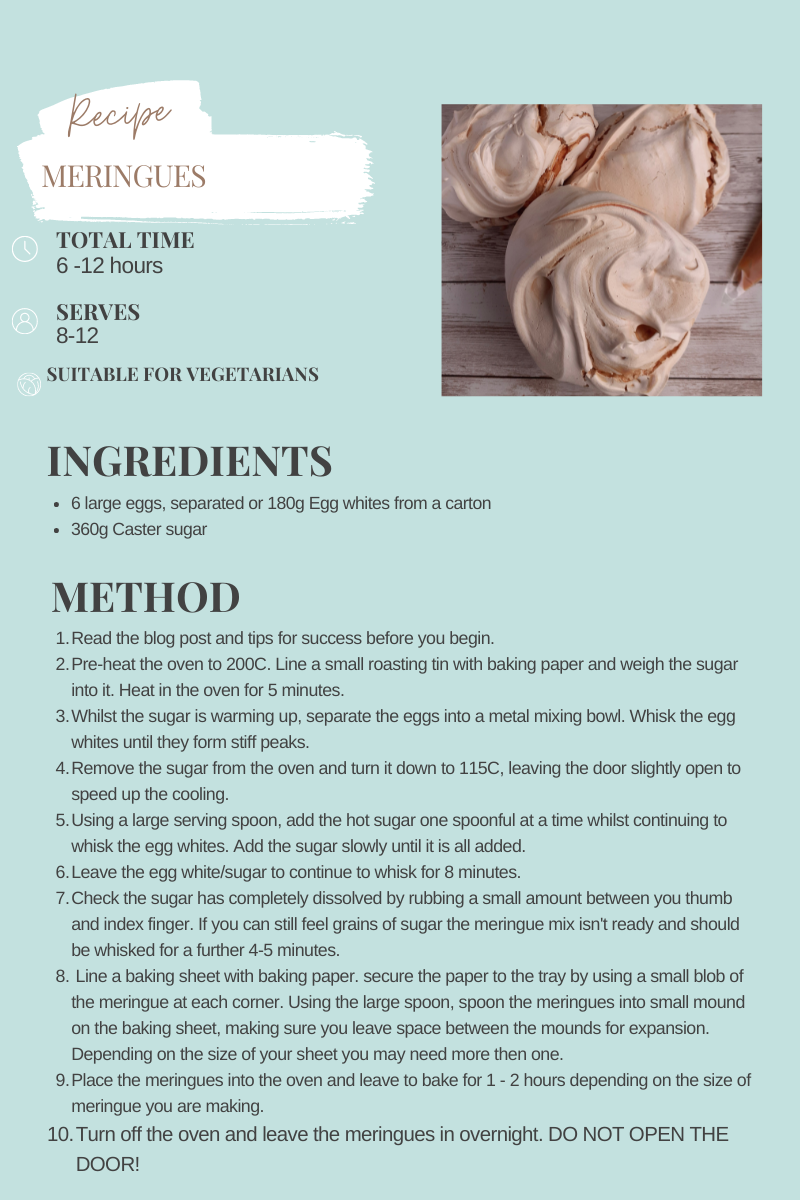My foolproof top tips for the perfect meringue.
Whenever I would have my massive meringues on display, lots of people would admire them and then proceed to tell me that they can't make meringues to save their lives. Follow my top tips and you will make the perfect meringue every time!

Meringues consist of 2 ingredients - Eggs and Sugar. The ratio I use is 2:1 sugar to egg whites.
Firstly, and most important, is the Egg.
But NOT THE WHOLE EGG!
For meringues you must only use the egg white.

The egg white is the part that contains the protein. Protein is what forms a protective barrier around the air bubble and gives the meringue structure. This structure doesn't like fat, and fat is held in the yolk, so this part that needs to be removed.
This is what is meant by separating the eggs.

None of the egg yolk can get into the egg white or it won't whip up. The fat causes the air bubbles you have created to pop or not form in the first place.
Other forms of fat such as butter or oil, also have the same effect.
There are lots of videos that show you how to separate an egg if you are unsure how to do it. This is my 'how to' video for making meringues.
If you want to skip this bit then you can buy the egg whites already separated and sold in a carton. The only difference is that you will need to weigh out the amount of egg white you need.
The next important ingredient is Sugar.
Sugar helps to strengthen the walls around the bubbles, thus stabilising the foam.
Don't use granulated sugar, the crystals are too big and will take too long to dissolve into the mix, causing you to over whisk the egg whites. Use Caster sugar.
Sugar is added after the foam is formed because if it's added before it will slow the process down and your eggs will take forever to whip up.
Sugar is also there to provide a structure after the foam has been exposed to heat.
Sugar is there to make the egg whites taste batter and help them to go brown when heated!
That's the science bit, now the practice bit.

Tips for success.
Make sure the bowl you are going to make the meringues in is completely free of any oil or grease. Avoid using a plastic bowl as this tends to hold onto fat. Just before you use it you should give it a wash in hot soapy water and then rinse out with cold water to remove the bubbles. Dry the bowl.
Use an electric whisk or free standing mixer with a balloon attachment. The eggs take a lot of time to whisk up using a hand held whisk. Your arm will get very tired before you have gotten anywhere near enough air into it. Then you have to whisk it whilst adding the sugar, so more arm ache.
Make meringues at the end of the day when the oven will not be used and can be left to cool down slowly overnight. This is important because the heat will make them expand but as soon as you open the door, they cool down too quickly and the meringue will crack, probably break.
Heat the sugar up. This is done simply by putting it in a small roasting tin, in the oven for 5 minutes at 200oC. This speeds up the sugar dissolving into the foamed egg whites.
Additional tip.
You have probably read that you add cider or white wine vinegar/lemon juice and cream of tartar to your meringue. I don't. I beat my eggs long enough to ensure the sugar has completely dissolved, and then put them in the oven to dry over night.
Vinegar/Juice will help the protein strands in the egg white to break down more. This helps because if too many broken protein strands rejoin together then they don't form around the air bubbles, and they pop. This helps when the eggs are fresh. Fresher eggs have a stronger protein matrix than an older egg.
Have you noticed that when you break on older egg open there is quite a bit of liquid compared to the fresh egg? That's water. Over time the protein strands that are holding onto the water in the egg, start to unwind and break, releasing this water. If your eggs are old then adding cornflour will help to stabilise the foam because the protein is weaker.
Use these tips and the following recipe anytime you want to make Meringues. It's good for any size of meringue: from small meringue kisses, to a massive pavlovas.

Let me know how you get on.

.png)
Comments